#M Aurelius
Text
If someone is able to show me that what I think or do is not right, I will happily change, for I seek the truth, by which no one was ever harmed. It is the person who continues in his self-deception and ignorance who is harmed.
~M. Aurelius~

#M Aurelius#Marcus Aurelius#Marcus Aurelius quotes#see#think#change#seek truth#self deception#ignorance#change makers#think different#be different#love different#LHA#1introvertedsage#quotes#say cheese#reflection#reality#happily change
5 notes
·
View notes
Text

garnet is the only one who will try to argue with a philosopher that literally shares her philosophy if shes bored (she really loves winning arguments)
#rat noises#steven universe#su#garnet#su pearl#su garnet#pearl#rose quartz#amethyst#su amethyst#historical gems#marcus aurelius#shhh shut up idc what different variants of stoicism they both believe. this is irrelevant information!! i m going to eat a pudding
2K notes
·
View notes
Text
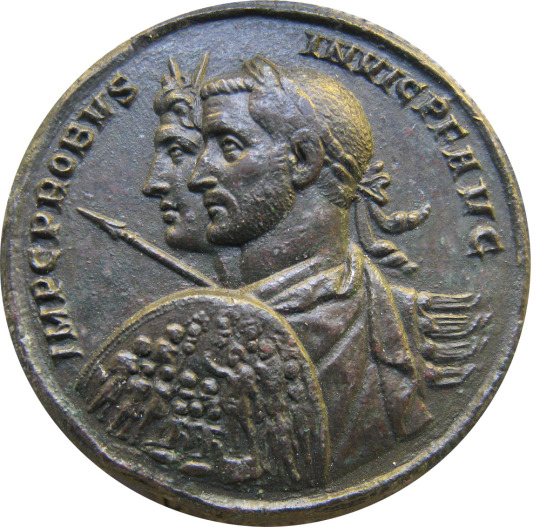
Coin minted ca. 280 CE by the Roman emperor Marcus Aurelius Probus (r. 276-282). Probus is shown in the company of Sol Invictus ("Unconquered Sun"), a late form of the solar deity whose worship had been promoted by Probus' predecessor Aurelian. The birthday of Sol Invictus (Dies Natalis Solis Invicti) was traditionally celebrated on Dec. 25. On this coin, Probus, who was constantly on campaign during his brief reign, is shown prepared for battle with shield and spear, alongside Sol Invictus, who wears his characteristic radiant crown. Now in the National Museum of Denmark, Copenhagen. Photo credit: ChrisO/Wikimedia Commons.
#classics#tagamemnon#Ancient Rome#Roman Empire#ancient history#Roman history#Probus#M. Aurelius Probus#Roman religion#Ancient Roman religion#religio Romana#Sol Invictus#art#art history#ancient art#Roman art#Ancient Roman art#Roman Imperial art#coins#ancient coins#Roman coins#Ancient Roman coins#numismatics#ancient numismatics#Roman numismatics#National Museum of Denmark
307 notes
·
View notes
Text

Quest4Futurism @etsy.com
#marcus aurelius#emperor#black aesthetic#brutalism#inspiration#quotes#motivation#renaissance#m#marble
18 notes
·
View notes
Text
not only have I had to deal with walter white hrt anon but I have had to see so many bad takes on religion today. transandrophobia rides again
#marcus aurelius has already already exempted you from needing to have a take#also it costs 0$ not to be a dick to people about their faith.#m.
27 notes
·
View notes
Text
@mxrvelouscreations | continued
His soon-to-be-wife looks as if she’d rather run than stand here with him. Which is understandable, considering the circumstances of having never formally met one another. She looks to be at least a few years younger than him to boot.
But she speaks, and Aurelius will take that as a good sign. She’s not sobbing or begging to be allowed to leave. Which he’d witnessed six months ago at his best friend’s wedding. So they’re already doing better than that.
“It suits you all the same. Just breathe,” Aurelius advises as the music dies down and the priest begins to speak. “This will be over before you know it, and you’ll be sipping champaign with friends and family.”
It’s about as comforting as he can be about this for her. At least, without seeming like a monster.
#c. aurelius#i. aurelius x sophie#( goldenboy | t h r e a d )#( not what he s e e m s | aurelius base timeline )#mxrvelouscreations
6 notes
·
View notes
Text
🎨🖌️
6 notes
·
View notes
Text
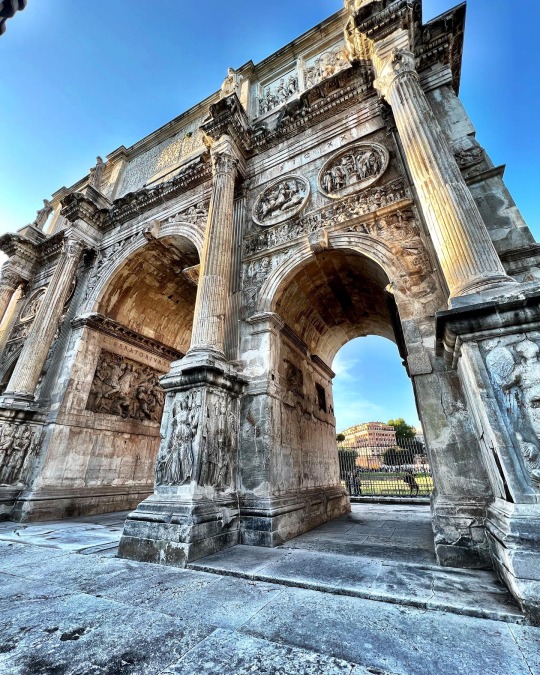
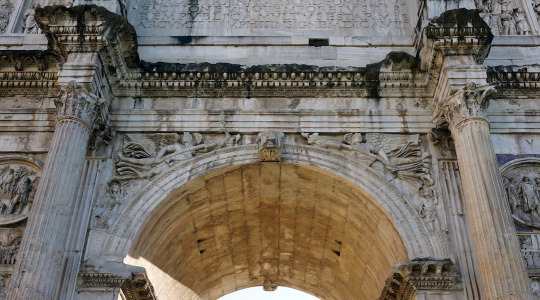

Arch of Constantine in Rome, is a triumphal arch that is located between the Palatine Hill and Celio, on the Via Triumphalis. It was erected in the year 315 to commemorate the victory of Constantine I the Great, against Maxentius in the battle of the Milvian Bridge (year 312).
Its state of conservation is extraordinary, being with the Arch of Titus and the Arch of Septimius Severus (both in the Forum) the only ones still standing today in the city of Rome.
It is curious because it was built with pieces from different buildings, such as statues taken from Trajan's Forum and reliefs in which Marcus Aurelius appears distributing bread to the poor, and Trajan represented after his victory in Dacia. The monument is made up of three arches and is 21 m high and 25 m wide.
603 notes
·
View notes
Text
Commodus: The end of an Era. "The reign of Commodus marked the end of the Golden Age and the beginning of the Age of Rusty Iron." Cassius Dio

Lucius Aelius Aurelius Commodus was born on August 31, 161. Curiously, he was born on the same day and month as 'Caligula', the first assassinated Roman emperor. He was the first who been born being the son of the reigning emperor, Marcus Aurelius.
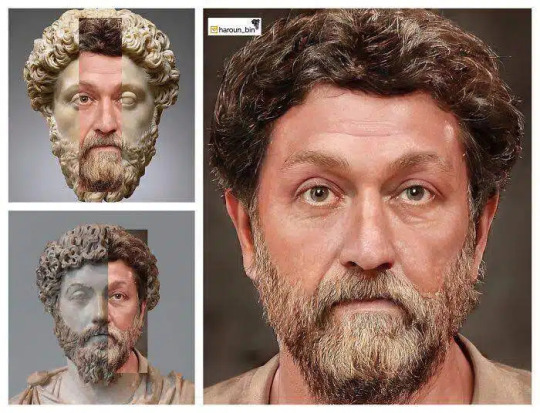

M. Aurelius and Verus ruled together in perfect cooperation for eight years. Verus fought against the Parthians who had threatening to take Syria and Armenia. Returned to Rome and had his triumphal parade without knowing that he and his legions were carrying a virus that arose in the war zone. The plague spread throughout the empire and was the deadliest in Roman history. In 169 Lucius Verus died due this plague.
The boy Commodus
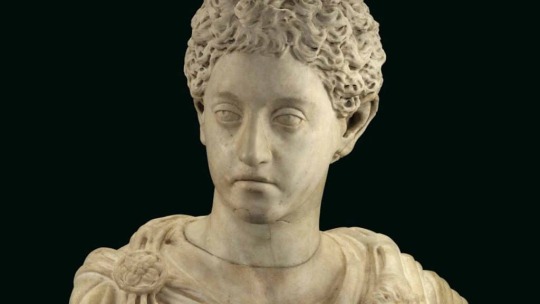
In 172, at age of 11, he received, in the presence of the army in Germania, the title Germanicus (a victory tittle). He participated alongside his father in several battles.
175. Empress Faustina the Younger died of natural causes in Cappadocia where she accompanied her husband. On the same year Commodus entered the College of Pontiffs, which was the starting point of his public career.
176. Marcus Aurelius granted him the position of Imperator, and the following year the title Augustus.
In January of 177, at the age of 15 , he became the youngest consul in the history of the Empire.
178. At age of 16 married to Bruttia Crispina, a very rich 13 year old girl.
March 17, 180, Marcus Aurelius died of natural causes and Commodus became sole emperor at the age of 18.
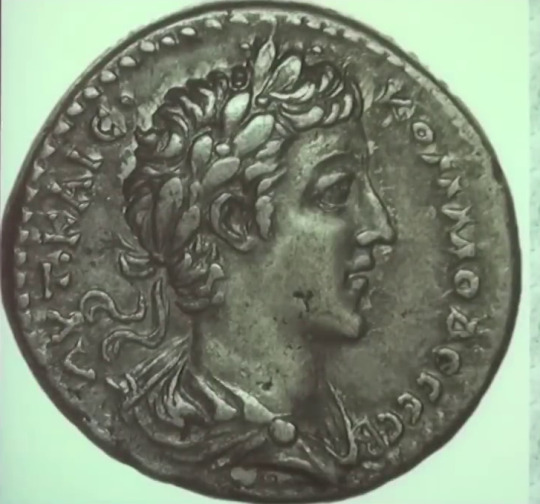
His first measure was to sign peace treaties both with Germanic tribes and some rebellious people of Britannia. This was frowned upon by his contemporaries, but modern historians agree that it was the only good action he ever took during his entire reign.
About his sister.

Lucilla had been co-empress and held the title Augusta along with her mother when she married the co-emperor Lucius Verus. Following Verus' death, Marcus Aurelius married her to senator Tiberius Pompeianus, a man of humble origins and without ambitions. In this way she lost the privileged position that she had.
In the winter of 181-182 Lucilla with her cousins Quadratus Annianus and Ummidia Faustina, her husband's nephew, Quintianus, and her own daughter Plautia, agreed to assassinate Commodus in the exit hallway of Flavian amphitheater (Colosseum) .The one chosen to kill was Quintianus. Incredibly, although proven, Pompeianus was completely unaware of the plot of his wife.

According to historical sources, when Quintiano saw Commodus, instead of stabbing him, slowly took out his dagger, showed it to him and said "The Senate send to you this dagger." Commodus shouted for his guard who immediately arrested him. The names of the involved were quickly known; Quintianus and Quadrato were executed. Lucilla, her daughter, and U. Faustina were sent into exile on Capri but and also executed there.
Following this event, he distanced himself from the elite and began to trust only in people of humble origins, among them Marcus Aurelius Cleander, former slave and freedman of Marcus Aurelius. In a short time he held important positions until he became the head of the Praetorian Guard.
In 187 due his wife's failure to become pregnant, banished her to Capri. 26-year-old Commodus, instead of marrying another aristocratic woman, chooses to have a concubine- Marcia, daughter of a freedwoman of co-emperor Lucius Verus.

The emperor treated her as a wife, so she had the same power and influence as an empress. It is very probable that Marcia was a Christian since she convinced Commodus to implement a pro-Christian policy, and had a close relationship with Victor I , Bishop of Rome.
Villa of the Quintilii and the rebellion of the people.

Commodus and Marcia retired to the lavish Villa of the Quintilii, whose ruins are today an archaeological site. On April of 190 the people had revolted in Rome because of famine.
There is a suspicion that the shortage of food may have been caused by the prefect of Annona (the import and free distribution of grain to the people) Papirius Dionysius who blamed Cleander.
During a horse-race in the Circus Maximus, the audience to rioted against Cleander. He escaped and managed to reach the Villa of the Quintilii to ask the emperor for help, but the mob followed him there. Commodus, fearing the fury of the people, ordered Cleander to be beheaded.
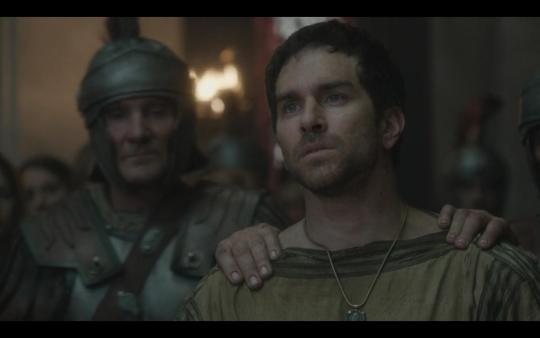
By then Commodus was already showing signs of an extreme megalomania and paranoia. The list of people executed, accused without evidence of conspiracy, including his own aunt, consuls, senators and praetorians, is endless. Those conspiracies were only in his mind.
It's curious that the ancient historians unfavorable to this emperor, asi his contemporary Cassio Dio, have not written about a child and teen Commodus doing bad or strange things; On the contrary, about a normal, correct child and teenager whose mental disorders began a few years into his reign. Perhaps the assassination attempt planned by his own sister and niece when he was 20 years old just beginning his reign, and feel that was compelled to order the execution of both, affected him psychologically in an irreparable way.
Madness and death.
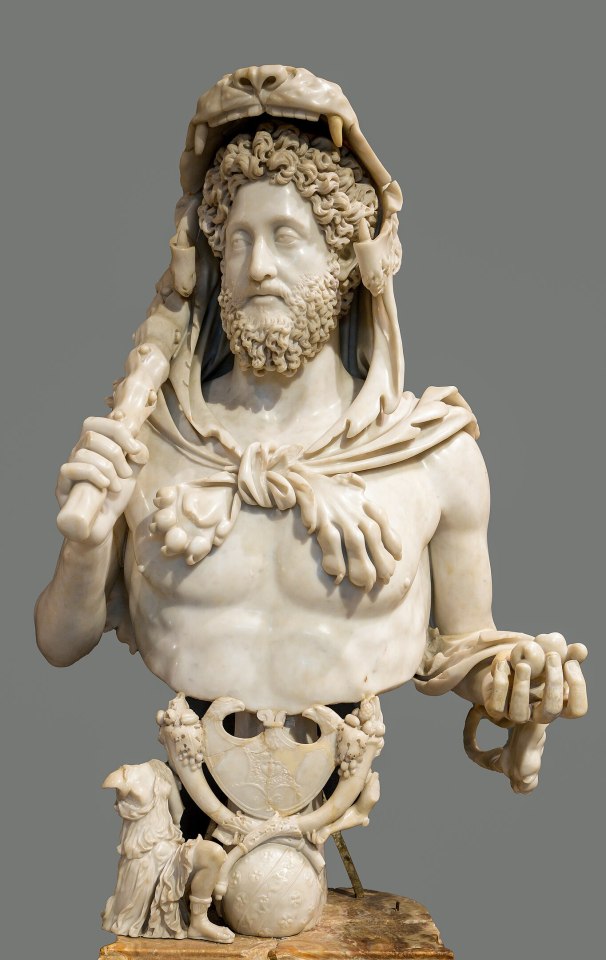

He gave himself the title PIUS, the same of his maternal grandfather emperor Antoninus, and ordered sculptures and busts of himself to be made representing him as Hercules.
In 192 changed the name of Rome to "Comodiana" and announced that a new era was approaching, he called it Saeculum Felix (Happy Century). The months also was renamed with Commodus own names and titles as well of his dynasty. Thus, the year would begin with the month Imperator followed by Caesar, Augustus,Commodus, Germanicus, Pius, Lucius, Aelius, Aurelius, etc, not even the mystical month of July was saved from this madness.
According to historical sources, he had shaved his beard, which had been in fashion since his grandfather's time, and also changed his thick curly hair for Gladiator curt hair style. Had his own games in which he fought with gladiators, who were forced to consume opium and drink wine excessively to ensure the victory of Commodus.
On December he announced that starting in the new year everything would change in Rome since the Senate wold be dismissed. Senators along with Marcia, who had had enough of Commodus, began to plan his death.
During the feast of December 31 Marcia put poison in his food, but Commodus had drunk too much and vomited immediately, so he ended the party and ordered that his bath be prepared.
Senators made Plan B; They sent a freedman named Narcissus, who "because of his size and strength he did not need to hide daggers or swords, his hands were enough." Narcissus found Commodus in the bathtub, and strangled him. Other sources say he drowned him in the bathtub. Be that as it may, 31 years old Commodus never saw his long-awaited new year.

On January 1, 193, the throne was auctioned to the highest bidder. The final price was stipulated at 25,000 sesterces per soldier. This caused a great scandal in Rome. Pertinax replaced Commodus, but on March he too was killed. Then Didius Julianus ruled for a few days. Finally that year Septimius Severus who was an excellent ruler- after his death, he was deified by the Senate- became the first emperor originally from the province of Africa; Born in Leptis Magna (modern Libya) was of Berber and Punic origin, and with his wife Julia Domna, born in Syria and Arab origin, they created the Severan Dynasty.
Commodus was not wrong when he said that from that year on everything would change in Rome.

Emperor Septimius Severus ( 193-211 )
47 notes
·
View notes
Text

Let's go back in time, Lovelies, to 2012. I had just mainlined The Hunger Games series for the first time (and the second, then the third) and had never read a fanfic. I barely knew what they were.
So I read my first fic. My First Date with Katniss Everdeen
It was unputdownable. (Is that a word? It should be a word.)
Anyway, I remember reading Mockingjay and being struck by the gap between when Katniss goes back to 12 and when Peeta returns. Where was Peeta? WHERE WAS HE? I became a bit obsessed.
Moving On was born. It's a short 33K fic that attempts to answer this question. Told from Peeta's point of view, the goal was to get the reader up close and personal with the action in the Capitol.
The Blurb: What happens to Peeta while Katniss is awaiting trial at the end of Mockingjay? How does he put himself back together? How does he end up back in District 12? Takes place before the Epilogue. Rating is T. May move to M due to some hijacking memories.
Fanfic.net
Almost immediately after finishing that, I started writing another. Building the Dream was meant to be my own sort of Empire Strikes Back. It's told in third person and it actually covers some of the same events of Moving On.
The Blurb: Dr. Aurelius treats Peeta and brings him back to himself at the end of Mockingjay. How does that happen? What role does President Paylor have in making sure Peeta can become whole without Plutarch using him as a piece in a new game? Rated T due to descriptions of Peeta's treatment by the Capitol post Quarter Quell.
Fanfic.net
If you decide to check them out, let me know!
What I loved about these stories:
They got me started on writing.
They were in-universe, canon. At the time that's what I loved to read.
There's no sex. (more on sex scenes much, much later.)
Both of these are *character first*. That's how I write all of my stuff and it's translated into my originals as well. I want to write characters that I want to read.
I loved Building the Dream because it really helped me develop an older love interest. Also, I'm especially proud of a few of the battle scenes.
What was hard:
I don't read a lot of political stuff, so the politics was hard. I remember talking to @randomnoteforfuturereference for hours over some of the things he thought would happen as a result of the events of Mockingjay.
It's meant to be a trilogy. I never wrote the third installment and that really bothers me.
I don't know why I never put either of these on AO3. I remember getting roasted horribly for a canon description mistake in Moving On, pulling it, correcting it, and then like, curling up and sucking my thumb for days. Clearly, that affected me.
One more thing. I'm pretty sure the third chapter of Building the Dream was right around the time I read Hotel Paper the first time.
It haunted me. Gutted me. I still think about it.
If you haven't read it, you should. Seriously. But be prepared to cry and need some tissues.
34 notes
·
View notes
Text

Marble portrait of the emperor Caracalla. 212–217 CE. x
Caracalla took the official name of M. Aurelius Antoninus Pius as part of the Severan dynasty’s attempt to appear as the legitimate and worthy successors of the secondcentury Antonine emperors. Despite this, in his official portraiture, he abandoned the luxuriant hair and beard of his predecessors for a military style characterized by closely cropped curls and a stubble beard. An ancient source records that on his deathbed, his father Septimius Severus advised Caracalla to “enrich the soldiers and despise everyone else.” This finely carved head is a powerful rendering of the official portrait and was probably produced at an imperial
workshop, since the statue fragments are said to have been found in Rome. It is from a statue, the legs of which also survive and are displayed in the Study Collection on the Mezzanine Floor.
126 notes
·
View notes
Text
The happiness of your life depends upon the quality of your thoughts.
~M. Aurelius~
#M. Aurelius#M. Aurelius quotes#happiness#quotes#life#quality#thoughts#be#mind#mindset#learning#see#mindfulness#mind control#control your mind#heal#LHA#1introvertedsage#healing
29 notes
·
View notes
Text
LUNAMARA: Fragments [6]

🦢
Felix is sure he once heard a philosopher say that only two things were certain: death and taxes. Having been embroiled in the political sphere quite against his will for the past 140 years of his life, he can say with certainty that not only is that true, but that people will occupy 90% of their time arguing about one or both topics when presented with the option to do so.
He doesn’t, technically, have to be here. He’s a mid-level bureaucrat at best, these days, and he worked hard to make himself less significant in the public eye, so he’s not obligated to turn up to public senate meetings. But Cas asked him, and Elsie– well, she didn’t ask, she’s too proud for that, but she also didn’t forbid him to come, which for a girl just a couple of decades past a century, means she desperately wants his company.
Cas plays his role as a guard very well. He looks imposing and cold in his gleaming armor, standing at attention with his spear in hand next to Elsie’s seat at the head of the long wooden table. His gaze is hard and constantly moving, sweeping over the irritated expressions of the senators in front of him. Behind them and further back, a much less organised gaggle of common people, those who are interested enough to take time out of their day to watch old fogies argue with a girl young enough to be their granddaughter.
The room is packed. He’s not sure what that says about their society, or whether the situation has simply gotten to a point where nobody can afford to be “disinterested in politics”.
“My Lady,” says a senator through his teeth, as Elsie inclines her head in his direction. “If the Queen’s government doesn’t disclose to its people the full details of the incident, I fail to see how we can maintain mutual trust!”
“You are expected to trust your Queen by her nature of being Queen, Senator Aurelius,” Elsennae replies. “And all the relevant details have already been disclosed to your office, and to the public.”
“And yet none of it pertains to exactly how long we have left running on our current power!” he snaps back, raising his voice and drawing a few shouts of agreement from the crowd. “The people need to know exactly how much is needed to keep their homes aloft. How else are we to live our lives?!”
Another senator slams her hand onto the table. “How long do we have until another cleaving event like this!?”
“If we don’t know, how are we going to evacuate people from the area in time?!”
“How long before Lunamara itself drops out of the sky!”
Elsennae raises her hands to calm her people, though it takes a few seconds before they quiet down. Felix feels his skin crawl with an unpleasant feeling. For some reason, it reminds him of the whistling of a mortar shell through the air.
“In the interest,” Elsennae says loudly and clearly. “Of the people of Lunamara not living their lives in anxiety and fear, we have chosen not to openly disclose the numerical values of the power needed to maintain current altitude. Regardless we ask for people to continue operating on minimum power at all times, and encourage those who feel ready to enter the Dream–”
Felix moves, but Cas moves faster, smacking the bolt of magic out of the air with his spear, and sending it careening into the nearby wall, where it explodes with enough force to knock multiple senators from their chairs. The crowd panics, as do the politicians, but Felix scrambles to Elsie’s side.
“Felix!” Cas barks, standing between the princess and the crowd. He’s looking for the offender, but in the chaos, it’s unlikely he’ll find them. If he does, Felix doesn’t envy them. “Get her out of here!”
He doesn’t need to be told twice. Elsie’s still small enough to be picked up, which he does, sweeping her into his arms and escaping out of the side door. The palace is a maze, but he’s as familiar with it as he is with his own face, so he takes a winding route that would lose any pursuers that could somehow get past Cas. Again, unlikely, but he’s not made it this far without being careful.
Finally, he stops in a small side room. Closing the door, he seals the edge of it with crystal. Hardly the strongest, but better than nothing. Then he leans against it, sliding down until both he and Elsie are sat on the floor.
This room used to be for servants, he’s fairly sure. It hasn’t seen use in a century, and the dust is prevalent. Elsie would probably use that as an excuse later, for why her eyes are bloodshot and her throat sore. A princess ruling in the place of her sleeping mother can’t afford to look weak.
For now, here with him, she’s just a little girl crying in his arms, shoulders shaking with the weight of an entire crumbling city upon them.
If Felix can bear at least some of the weight for her, he’ll attend every farcical meeting until the end of time.
🌗
More from LUNAMARA:
Fragments [1] [2] [3] [4] [5] [6]<-- More every Thursday!
Comic [Prologue]
Art by Luka (http://nousanti.tumblr.com/) Story by Pidge (http://pidgestories.tumblr.com/)
32 notes
·
View notes
Text
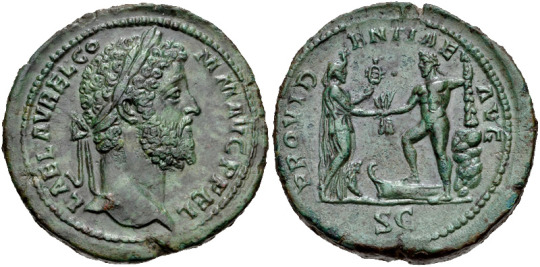
Sestertius of the notorious Roman emperor Commodus, minted at Rome in 192 CE, the last year of his reign. On the obverse, the bust of Commodus; on the reverse, the personification of Africa greets Hercules. Africa holds a sheaf of wheat (representing the grain the province produced) and a sistrum (the rattle associated with the goddess Isis), while Hercules stands on a ship's prow and holds his club.
The seemingly innocuous imagery of this coin masks the megalomania that characterized Commodus' final years. He is here styled Lucius Aelius Aurelius Commodus, his birth name; his father Marcus Aurelius had renamed him M. Aurelius Antoninus Commodus upon making him Caesar, but Commodus ultimately spurned both this name and his father's heritage. His identification with Hercules, a constant of his reign, reached a fever pitch at this time: the emperor officially styled himself "Roman Hercules" (Hercules Romanus) and engaged in beast-hunts (venationes) and gladiatorial matches designed to evoke Hercules' Twelve Labors. (In one infamous incident, he threatened to cast the audience in the arena as the Stymphalian Birds and mow them down with arrows.) Taking a dizzying array of new cognomina (Amazonius, Invictus, Exsuperatorius, etc.), Commodus demanded that each month of the year be named after one of his titles, and he even floated the idea of renaming Rome Colonia Aelia Commoda after himself. By December 192 his advisors had had enough, and a conspiracy was put in train, into which his mistress Marcia was recruited. She poisoned him; when this did not kill him, his personal trainer, one Narcissus, strangled him in his bath. With him ended the dynasty begun by Nerva nearly a century before.
Photo credit: Classical Numismatic Group, Inc. http://www.cngcoins.com
#classics#tagamemnon#Ancient Rome#Roman Empire#ancient history#Roman history#Commodus#art#art history#ancient art#Roman art#Ancient Roman art#Roman Imperial art#Hercules#classical mythology#coins#ancient coins#Roman coins#Ancient Roman coins#sestertius#metalwork#brass#brasswork#numismatics#ancient numismatics
151 notes
·
View notes
Note
Can I have some classic lit recs…make me feel like Henry please <3
Oh, this would be my pleasure, my dear friend!
Caligula by Albert Camus (It's a play about Caligula)
Oresteia by Aeschylus
Cicero
Coriolanus and Titus Andronicus by Shakespeare. Coriolanus speaks about men's hubris and how pridefullness brings your downfall, while Titus Andronicus, well, I'll let you discover it by yourself:))
Marcus Aurelius, amazing works regarding stoicism
Seneca, letters to Lucilius, another great stoic
Petrarca's letters to classical authors
Ovid, the roman writer exiled by Augustus to the Black Sea, at Tomis, part of the Kingdom of Thrace (now Constanța, Romania), where he kept writing.
Bacchae by Euripides
Quo Vadis by Henryk Sienkiewicz (a nobel awarded historical fiction about the life in Nero's Rome, written by a Polish writer)
Sappho, but I suggest finding a good translation with footnotes as her works have been barely maintained, and some of her poems are literally one word long.
Beyond good and evil by Nietzsche
Crime and Punishment by Dostoievsky (I won't add more as I recently conducted a full ass campaign here on how and why this book is worth it)
E.M. Cioran, A short history of decay, The demiurge, The troubles with being born. He is a bit of a nihilist. Romanian philosopher that wrote mostly in French
Machiavelli, The prince. This should be a good introduction into Machiavellism
The sacred and profane by M. Eliade is also worth a try
I believe there's no point in mentioning the Iliad and the Odyssey since everybody knows them by now. Hope you'll have fun!
#classic lit recs#dark academia#basically a lit student#the secret history#Dostoievsky#quo vadis#seneca#marcus aurelius#caligula#niccolo machiavelli#ovid#philosophy#classics
139 notes
·
View notes
Text
By Chapter XIII, I can understand the irritation of those reading the Brick for the first time, expecting to encounter some of the main characters, only to find themselves immersed in the bishop’s credo. Personally, I don't mind, but I sympathize with first-time readers. Here are some thoughts on this chapter:
So, just in case anyone still had doubts, Hugo once again hints that Bishop Myriel’s faith is far from orthodoxy.
He is an interesting character: on one hand, we learn about his excessive love for all living creatures, making him akin to Francis d’Assisi and Marcus Aurelius. On the other hand, Hugo mentions that in his youth, M. Myriel was “a passionate, and, possibly, a violent man.” I’m absolutely intrigued and want to know more about his youth, and especially what happened to him in Italy that led him to become a priest. I also want to know what his sister was doing at the time when he was married and leading a passionate and violent life. I suspect that she did not have the chance to experience her share of passions. Therefore, I think it’s unfair to deprive her of little comforts at the dusk of her life.
The details about the peculiarity of the bishop’s faith mirror Hugo’s own views about faith and religion extensively enunciated in the convent digression in the second volume.
An elderly bishop who finds his happiness in the garden is just the first of many others in the Brick for whom a garden is a happy place. If I am not mistaken, there is an essay about imagery of the garden in Les Misérables in a volume about the book and adaptations.
27 notes
·
View notes